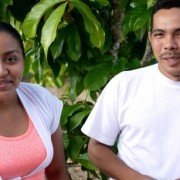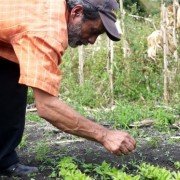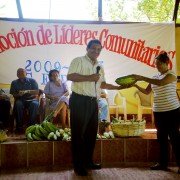We’re Taking Our First Steps In New Communities
Farmers, leaders and young people in 42 communities around Nicaragua are brimming with excitement about the possibilities the see for their upcoming five years of work with CEPAD.
“It’s such an amazing opportunity, we are ready to work hard and get organized as a community,” said Rokue Castillo, a leader in Bijague, a community in San Francisco Libre. “Our biggest priority is to develop skills for drought management, because this year has been really hard.”
This week, CEPAD staff are traveling to every one of the new communities where we will begin work in 2015 to talk with members and get an idea of what they know already and what they hope to achieve. Pedro Joaquin, the technician from the Jinotepe region, helped out with collecting baseline data in San Francisco Libre. Rokue was worried that he didn’t have any of the skills Pedro asked him about, like how to lead community meetings or make a petition to the local government.
“Don’t worry,” Pedro told him. “When we come back to ask the same questions next year, you will be amazed at how different your answers are.”
The baseline data collection is a critical step for CEPAD as we leave the communities where we have been working since 2009 and begin working in new ones. In some areas, for example, farmers have received training from other organizations or from neighbors in certain techniques, like how to make organic fertilizer. In others, their knowledge is limited to the standard practices like chemical pesticides and field burning. CEPAD interviews every citizen who will work with any of our programs to see what their needs are so we are ready to work with them meaningfully when we officially begin in January.

Simon Treminio, a farmer in Las Mercedes, told CEPAD engineer Denis García he is excited to learn about organic techniques and grow more diverse and nutritions types of vegetables to feed his family.
In Las Mercedes, a community in San Francisco Libre, farmer Simon Treminio said he has had very weak harvests this year and is worried about the future of his 10 acres of land.
“I want to learn how to improve the capacity of my farm,” he said. “I hope we can achieve better nutrition and maybe even be able to sell some of our crops.”
In Las Mercedes, as in all the communities where CEPAD is beginning work, most farmers barely grow enough to feed their families and aren’t able to sell any crops to earn money. Over the next five years, that will change for many families.
We’ll be able to report more of the baseline data in coming weeks. Carlos Silva, the assistant program director for CEPAD, said he was really impressed by the willingness to work he saw in all the communities.
“It’s wonderful to see that people are already involved and engaged,” Carlos said. “The women are really excited and capable, and the men demonstrated a lot of eagerness to begin. There is so much potential in these communities.”



